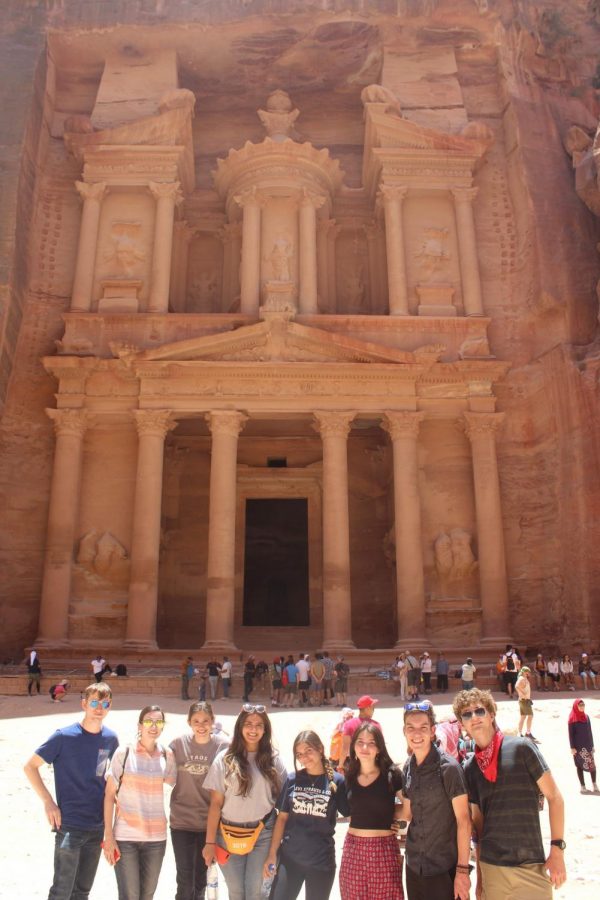Marhaba from Jordan
Arabic Students spend summer immersed in culture & language of Middle East with QFI grant
The desert sun beat down
on the students as they
walked down the dusty
trail. Donkeys and
horses trotted by, and Bedouin
shopkeepers shouted prices in
Arabic. The path narrowed and
the afternoon light painted the
sandstone walls golden orange. The
path opened up around the bend
and revealed the magnificent facade
that is famed around the world, the
imposing Treasury of Petra, carved
into stone thousands of years ago.
The Arabic program received
$28,000 from Qatar Foundation
International to go on an allexpenses-
paid, eight-day trip to
Jordan over the summer to learn
about water conservation, practice
Arabic and explore the culture.
“We did a different thing
every day; we went to Petra and we
went to Wadi Rum,” senior Zayna
Chouman said. “We walked around
the capital Amman a lot at night.
We stayed in the desert for two
nights.”
Seven students and former
Arabic teacher, Priscilla Cunha,
went on the trip at the beginning
of June last summer. One student,
senior Genevieve Clemons, helped
with the grant-writing process and
spent months planning for the trip.
“It was very difficult to make
such a thing happen when all of
us had no experience in the grant
writing process or the bureaucratic
process of getting permission from
the school,” Clemons said.
The goals of the trip were to
improve students’ conversational
Arabic by talking to locals, as
well as to learn about water
conservation throughout the
country of Jordan.
“The trip gave me a first-hand
experience of what it’s like to be
in a Middle Eastern country, and
it gave me a perspective into the
environment, people, and society,”
Clemons said. “It really increased
my respect for the culture, because
I found lots of very open and kind
people that were willing to invite
me into their shop or their home.”
Students participated in
activities such as biking, swimming
in the Dead Sea, eating with locals
and scrambling up sandstone
boulders in the desert of Wadi
Rum, which is well-known for being
the film location of movies such as
The Martian and Aladdin.
“My favorite part was Wadi
Rum, and staying in the Bedouin
camps,” Chouman said. “I
thought that was a more authentic
experience than just walking
around downtown and shopping
and doing touristy things. It was
more about the experience instead
of just being there.”
Most of the students who had
never been to the Middle East
before experienced a degree of
culture shock, even Chouman, who
has been to the Middle East before,
was also surprised by different
aspects of Jordan.
“I expected it to be more
progressive than it is, just because
I’m used to Lebanon,” Chouman
said. “The biggest thing that I’ve
learned is that if you’re a girl, you
can’t walk in the street alone; that
was kind of shocking to me. But it’s
complicated, because I also know
that a lot of places in the Middle
East are way worse with that, so it’s
kind of progressive for the area.”
Students learn about different
countries and cultures in their
classes, but traveling allows
students to see what they have
learned in real life. Director of
academies Nicole Griffith believes
that travel is a mind-opening and
life-changing experience.
“When you get out there and
see things with your own eyes and
experience culture—smell the food
and taste the food and see what’s
happening on the streets—it’s
so enriching,” Griffith said. “It
brings all of your learning together
and helps you see a perspective
that we can never show you in a
classroom.”
This was the first trip where
students in the Arabic program had
the ability to travel abroad together,
and Chouman hopes something
similar will be offered this year.
“I think it’s a really cool
experience that we got to travel at
all because most language classes
don’t get to do that,” Chouman
said. “I feel like being in an Arabic
speaking country helps me learn a
lot more than in a classroom, and it
was just a privilege to experience it
in high school.”
Clemons encourages high
school students to learn about
different cultures and take
opportunities to travel if they are
offered.
“Pursue that interest and
to find out as much as you
can, because it’ll really make a
difference in the way you look
at the world,” Clemons said. “I
think it’s really important as our
world becomes more globalized to
preserve the diversity and learn to
appreciate and respect it, rather
than fear it.”








